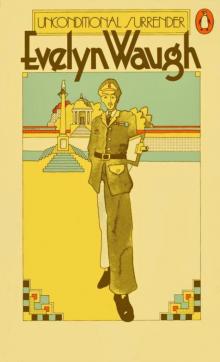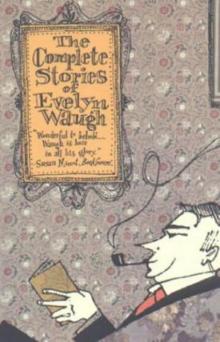- Home
- Evelyn Waugh
When the Going Was Good Page 8
When the Going Was Good Read online
Page 8
But there was one party who had a still sadder time of it. They were five Scots people in early middle age, three women and two men, interrelated in some way that I never had occasion to define. These were caught by a very shady guide who took them up to the Kasbar in a taxi-cab. He charged them 200 francs for this drive, which they politely paid without question. He then took them to a house in a blind alley, knocked on the door three times, and excited their uneasiness by saying, ‘This is very dangerous. You are safe as long as you are with me, but on no account get separated or I cannot answer for the consequences.’ They were admitted one at a time and charged 100 francs each. The door was shut behind them and they were led down to a cellar. The guide explained to them that they must order coffee, which they did at the cost of 20 francs a head. Before they had tasted it a revolver shot sounded just outside the door.
‘Run for your lives,’ said the guide.
They scampered out and found their taxi, which, by apparent good fortune, was waiting for them.
‘No doubt the ladies are feeling unsettled by their experience. Would they like a little cognac?’
He then directed the car, which cost another 200 francs, to one of the ordinary cafés of the town and gave them each a tot of eau-de-vie. He settled the bill for them and explained that it had come to 25 francs a head and 10 francs for the tip.
‘That is the advantage of coming with me,’ he explained. ‘I do the tips for you and you are not put upon. There are many cheats in this town who would take advantage of your inexperience if you were alone.’
He then saw them back to the ship, reminding them discreetly that the fees for his evening’s services were 100 francs or whatever they liked to make it. They were still so bewildered and agitated that they gave him a hundred and fifty, thanking him very much and congratulating themselves on the narrow escape they had had.
It did them credit that they did not conceal this dismal story, but told it to everyone on board, half resentfully but half humorously.
‘I’d like to go back and have a few words with that merchant,’ remarked the men of the party, but, alas, by that time we had left Algiers.
All over the world there are rock formations in which people profess to see the likeness of natural objects – heads of crusaders, dogs, cattle, petrified beldams, etc. There is an idea, started, I believe, by Thackeray, that the Rock of Gibraltar looks like a lion. ‘It is the very image,’ he said, ‘of an enormous lion, crouched between the Atlantic and the Mediterranean, and set there to guard the passage for its British mistress.’ Everyone else on board was instantly struck by the felicity of this image, so I suppose that it must be due to some deficiency in my powers of observation that to me it appeared like a great slab of cheese and like nothing else.
An English policeman with helmet, whistle, truncheon, and rolled mackintosh cape was on duty at the landing-stage. I think this man pleased the English passengers more than anything they had seen in their travels. ‘It makes one feel so safe inside,’ said one of the ladies.
I walked for some time about those very clean streets, feeling that there could be no town in the world without something of interest somewhere. The shop windows displayed little except seedy shaving brushes and tarnished cutlery and indefinable objects stitched on to cards; there were chemists’ shops selling English aperients and patent pills; a paper-shop selling three-penny novelettes and twopenny weeklies; a few curiosity shops with a stock oddly composed of little Victorian and Edwardian knick-knacks – descended presumably from officers’ villas – and flaring modern embroideries and beaten metal from Tangier. There was a tobacconist selling Dunhill pipes and tobacco-jars ornamented with regimental and naval devices. I passed some sailors’ wives standing near a milliner’s window; they shrank as I passed as though I had brought with me some of the polluted air of Málaga. Most of them, I learned later, keep strictly to their houses when there are ‘trippers about’, like Hampstead residents on bank-holidays.
As I was walking along very disconsolately I found a notice which said, ‘To Brighter ’Bralter. ’ I followed it for some way until I came to another, similar announcement, and so, in pursuit of pleasure, I began a kind of lugubrious treasure hunt, following these clues through the length of that town. At last I came to the South Port Gate and a neat little cemetery, where are buried a number of men who fell at Trafalgar. Many of the graves were of pretty, Wedgwood pattern, with urns and delicate carved plaques. Somewhat farther ahead, in a kind of recreation ground, preparations were being made with tents and awnings for some kind of gymkhana. I felt, however, that the posters had at least led me to the one tolerable spot on the Rock.
At the time of our visit, Seville was illuminated in the evenings by flood-lights, in honour of the Spanish-American Exposition.
This exhibition had only just opened, and many of the buildings were still unfinished. It must not be supposed, however, that the project had been hurriedly or frivolously undertaken. The 1913 edition of Baedeker’s Spain and Portugal mentions that large portions of the park were at that time closed for the preparations. We were presented on landing with a prettily decorated prospectus written in English, which remarked: ‘Five hundred years from now the descendants of those who visit this Exposition will see with their own eyes these very same buildings, mellowed by the passing ages, but equal to their present grandeur in lines and in massive construction.’ Some of the buildings certainly will profit by mellowing, being at present very gay indeed in a bright patterned brickwork and coloured tiles; a little too gay, perhaps, for their ‘massive construction’ and the academic future ordained for them. Their contents, however, were magnificent. I spent a delightful afternoon quite alone in the two great art galleries. So far from suffering the bargain-sale scramble of a loan collection in London, one was able to walk round these superb galleries absolutely alone.
But the whole exhibition was like that. Tourists had so far not arrived in any appreciable quantities, and the Sevillians after sixteen years’ preparation were bored with the whole business. There were elements of ill-feeling in their neglect. They considered that the price of admission was too high and that they had been unrighteously defrauded of the use of their favourite park. There was no organized boycott, but it just so happened that no Sevillians went to their exhibition. There was a model railway, with a miniature steam-engine, which took an empty train round and round the ground; there was an Atracción Park in which a great wheel revolved, empty; there were switch-backs and scenic railways on which empty cars swooped and swerved through breath-taking descents; there were silent rifle ranges with heaps of ammunition lying undischarged and mountains of bottles unbroken; in the evening the gardens were brilliantly illuminated; the trees were filled with electric-light bulbs in the shape of apples, oranges, and clusters of bananas; ingeniously concealed flood-lamps made the lawns luminous and many-coloured; electric lights were hidden under the water-lilies on the lake; illuminated fountains sparkled high in the air, like soundless and inexhaustible fireworks. It would have been a fascinating scene even in a Wembley crowd; on the night of my visit there was not another figure stirring anywhere; I felt as if I had achieved the Nonconformist ideal of being the only righteous soul saved in the universe; quite, quite alone in the whole of paradise. I suppose it really is not wholly gracious to emphasize this particular feature of the exhibition, as it can clearly not have come about by any deliberate intention of the organizers. To compliment them on it is somewhat like the polite painter who I once overheard, while being shown round the infinitely nurtured and tended garden of an acquaintance, congratulate his host on the excellence of his ‘soft, mossy lawns’. Rather a touching paragraph in the prospectus said: ‘In view of the large number of visitors expected at Seville throughout the Exposition, several new hotels and two garden-cities have been constructed … suited equally, in their variety, to the millionaire and to the most moderate purses … Seville will accommodate some 25,000 visitors simultaneously throughout the Exposition.�
�� It certainly merited the concurrence of 250,000, but I was very thankful that I saw it as I did, before anyone else arrived.
In Sao Roque at Lisbon I reflected: It is only since the discovery of photography that perspective has ceased to be an art.
We sailed late that evening. Next day we were in a choppy sea, with a cold wind blowing from the shore, and that night we came into the Bay of Biscay; the ship developed a slow roll which caused serious discomfort to many. A great number of the passengers remained on deck during luncheon, nourishing themselves with dry biscuits and quarter-bottles of champagne. The roll went on undiminished until we rounded Cape Finisterre late in the afternoon.
The sea was quite calm now that we were out of the Bay of Biscay, but we ran into recurrent banks of fog which held up our progress; there was talk of our not getting in until late the next afternoon.
That evening there was a small party in the Captain’s cabin, consisting of the officers off duty and two or three of the Scandinavian passengers and myself; we drank each other’s health and exchanged invitations to visit each other in our countries. After a time I went out from the brightly lighted cabin on to the dark boat-deck. For the moment the night was clear and starry. I was carrying my champagne glass in my hand, and, for no good reason that I can now think of, I threw it out over the side, watched it hover for a moment in the air as it lost momentum and was caught by the wind, then saw it flutter and tumble into the swirl of water. This gesture, partly, I suppose, because it was of its own moment, spontaneous and made quite alone, in the dark, has become oddly important to me, and bound up with the turgid, indefinite feelings of home-coming.
For to return to one’s own country, even after the shortest absence, is, in its way, an emotional business. I had left in the depth of winter and was coming back to late spring; then, if ever, England is still a lovely country.
While I still stood on the boat-deck we ran into another belt of mist. The engines changed to slow and then to dead slow, and the fog-horn began dolefully sounding the half-minutes.
In twenty minutes we were clear again, and running under the stars at full speed.
I woke up several times in the night to hear the horn again sounding through the wet night air. It was a very dismal sound, premonitory, perhaps, of coming trouble, for Fortune is the least capricious of deities, and arranges things on the just and rigid system that no one shall be very happy for very long.
Chapter Two
A Coronation in 1930
(From Remote People)
They were still dancing when, just before dawn on 19th October, 1930, the Azay le Rideau came into harbour at Djibouti. The band – a pitiably hot quartet in alpaca dinner-jackets – had long ago packed up their instruments and retired to their remote and stifling cabin. An Annamite boy was swabbing the deck and pushing into the scuppers sodden masses of paper streamers. Two or three stewards were at work pulling down the flags and festoons of coloured lights with which the ship had been decorated. One couple remained: a girl of mixed blood, second-class passenger to Mauritius; and an officer in the French Foreign Legion. Their feet moved slowly over the wet boards to the music of a portable gramophone; at intervals they stopped, and unclasped each other, to rewind the instrument and reverse the single record.
For two days of gross heat the ship had been en fête. There had been deck games, races for the children, a tombola with two-franc tickets and such prizes as could be procured on board – bottles of vermouth and eau-de-Cologne, tins of tobacco, sweets, lumps of coral, and ornamental cigarette-holders from Port Said. An autographed photograph of Marshal d’Esperez had been put up to auction and sold, amid wild applause, to a Press photographer for 900 francs; a cinema film had been exhibited by one of the passengers, with a faltering light on a screen that flapped restlessly in the hot breeze; there had been a horse-race decided by throw of dice, with a pari-mutuel and many hotly disputed results; at the deck bar there had been frequent orders for champagne, shared among families of French officials, six or eight of them to a bottle. Finally, on the last evening of the voyage, the fête had culminated in a fancy-dress dinner, a concert, and a ball.
It was a diverse company who had been thus indulged. There sat at my table a red-headed American on his way to Saigon, where he hoped to sell agricultural machinery; his watch-chain was loaded with Masonic insignia, he wore a ring of the interlaced initials of some other commercial secret society, he had Froth Blowers’ cuff-links, and a Rotarian wheel in his buttonhole; the Italian proprietor of the third-best hotel in Madras. There was a large number of French colonial officials, their wives and disorderly children, who make up the bulk of a normal Messageries Maritimes passenger list, on this occasion reinforced by a draft of the Foreign Legion on their way to preserve discipline in Indo-China. The men travelled fourth class, sprawling about the lower deck by day, battened down in the hold at night. They were mostly Germans and Russians; in the evening they formed into little groups and sang songs. They had a band of drums and mouth-organs which came up to play in the first-class saloon on the evening of the concert. The drum was painted, with the device ‘Mon Jazz’. Two of them climbed through a porthole one night in the Suez Canal and escaped. Next day a third tried to follow their example. We were all on deck drinking our morning apéritifs when we heard a splash and saw a shaven-headed figure in shirt-sleeves scrambling up the bank behind us. He had no hat and the sun was at its strongest. He ran through the sand, away from the ship, with gradually slackening speed. When he realized that no one was pursuing him he stopped and turned round. The ship went on. The last we saw of him was a figure stumbling after us and waving his arms. No one seemed the least put out by the occurrence. My cabin steward usually had some story to tell me of daily life on the lower deck. One day two of the legionaries began fighting and were put in the cells; another day a Chinaman went mad in the night and tried to commit suicide; another day there had been a theft on board, and so on. I think he used to invent a great deal to amuse me.
Besides this normal traffic of the line, there were about twenty of us bound for Djibouti on our way to Abyssinia for the Emperor’s coronation. Six weeks before, I had barely heard Ras Tafari’s name. I was in Ireland, staying in a house where chinoiserie and Victorian gothic contend for mastery over a Georgian structure. We were in the library, discussing over the atlas a journey I proposed to make to China and Japan. We began talking of other journeys, and so of Abyssinia. One of the party was on leave from Cairo; he knew something of Abyssinian politics and the coming coronation. Further information was contributed from less reliable sources; that the Abyssinian Church had canonized Pontius Pilate, and consecrated their bishops by spitting on their heads; that the real heir to the throne was hidden in the mountains, fettered with chains of solid gold; that the people lived on raw meat and mead; we looked up the royal family in the Almanach de Gotha and traced their descent from Solomon and the Queen of Sheba; we found a history which began: ‘The first certain knowledge which we have of Ethiopian history is when Cush ascended the throne immediately after the Deluge’; an obsolete encyclopaedia informed us that, ‘though nominally Christian, the Abyssinians are deplorably lax in their morals, polygamy and drunkenness being common even among the highest classes and in the monasteries.’ Everything I heard added to the glamour of this astonishing country. A fortnight later I was back in London and had booked my passage to Djibouti. Five days later I was on board the Azay le Rideau at Marseilles, and ten days after that I was standing on deck in my pyjamas watching the dawn break over the low coast-line of French Somaliland and over the haggard couple dancing to the gramophone.
Sleep had been impossible for some time, as the servants of the Egyptian delegation had been at work assembling their masters’ luggage immediately opposite the door of my cabin. Tin trunk after tin trunk was dragged out with loud military commands from the sergeant in charge and loud unmilitary remonstrances from his subordinates. It seemed hardly conceivable that five men could have so many clothes.
And after the tin trunks came the great crates which contained the King of Egypt’s present to the Emperor. These had appeared on board at Port Said under escort of an armed patrol, and throughout the voyage had been guarded with some ostentation; their contents had been the object of wild speculation among the passengers, our imaginations wallowing in a profusion of Biblical opulence – frankincense, sardonyx, madrepore, and porphyry. In point of fact, as appeared later, they contained a handsome but unexceptional suite of bedroom furniture.
There were three other delegations on board, from France, Holland, and Poland; a fourth, the Japanese, was awaiting our arrival at Djibouti. When not exchanging ceremonious introductions, or pacing the decks at great speed, these envoys occupied themselves with finely emblazoned despatch-cases, writing, typing and annotating their complimentary addresses.

 A Handful of Dust
A Handful of Dust Complete Stories of Eveyln
Complete Stories of Eveyln Brideshead Revisited
Brideshead Revisited Men at Arms
Men at Arms Black Mischief
Black Mischief When the Going Was Good
When the Going Was Good Officers and Gentlemen
Officers and Gentlemen Helena
Helena Unconditional Surrender
Unconditional Surrender The Ordeal of Gilbert Pinfold
The Ordeal of Gilbert Pinfold The Complete Stories Of Evelyn Waugh
The Complete Stories Of Evelyn Waugh